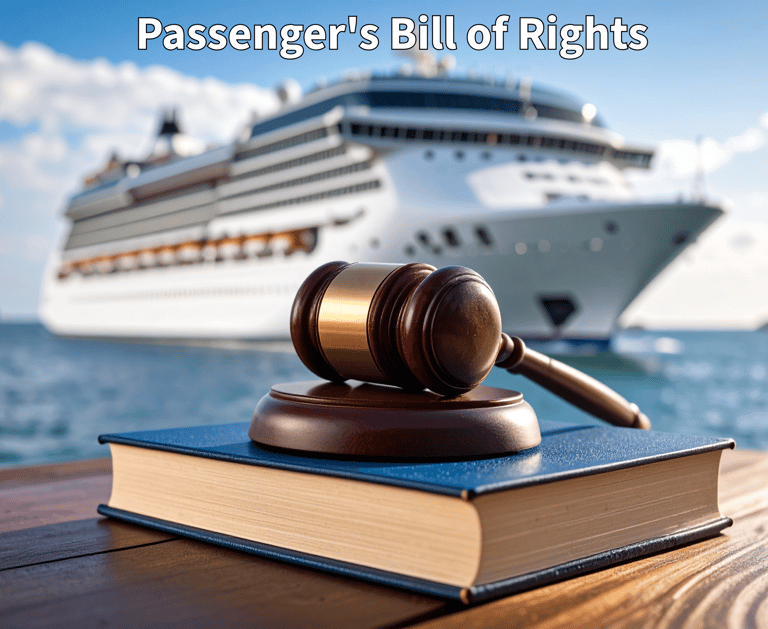U.S. Cruise Passenger Bill of Rights—Explained
Ever wondered what happens if your cruise turns into a “poop cruise” or suddenly changes course? Don’t worry—there’s a (voluntary!) Cruise Passenger Bill of Rights to help keep your vacation smooth sailing. This post breaks down your rights in plain English, shares wild real-world stories, and gives you the inside scoop on why you should always check your cruise line’s fine print before you set sail. Cruise smarter, laugh harder, and never be left in the dark again!
CRUISES
9/27/20254 min read


Cruising is usually smooth sailing, but stuff happens. That’s why the Cruise Passenger Bill of Rights exists—to give you peace of mind and real protections if things go sideways. But here’s something most travelers don’t realize:
The Bill of Rights isn’t a government law. It’s a voluntary set of standards adopted by cruise lines that are members of the Cruise Lines International Association (CLIA). Each cruise line agrees to uphold these rights, but the details and how they’re implemented can vary.
So, before you book, it’s smart to check your specific cruise line’s website for their own Passenger Bill of Rights and policies. Most major lines post this document online and make it available at booking and onboard.
Here’s what these rights mean for you—plus real-world stories and resources if you want to dig deeper:
1. The Right to Disembark a Docked Ship if Essential Provisions Cannot Be Provided
If your ship is stuck at port and can’t provide basics like food, water, restrooms, or medical care, you have the right to get off (as long as it’s safe and allowed by local authorities).
Why this matters: Remember the infamous “poop cruise”? In 2013, the Carnival Triumph lost power and was stranded for days with overflowing toilets and dwindling supplies. This disaster led to the creation of the Bill of Rights!
Read the CNN story on the Carnival Triumph “poop cruise”
2. The Right to Timely Information About Itinerary Changes in the Event of Emergencies
If something major happens—like a storm, mechanical problem, or health emergency—the cruise line must keep you updated about changes to your itinerary or arrival times.
Why this matters: Passengers have complained in the past about being left in the dark during delays. Now, cruise lines are expected to provide regular updates so you’re not left guessing.
Travel + Leisure: What Happens When Your Cruise Itinerary Changes?
3. The Right to a Ship Crew Trained in Emergency Procedures and Access to Emergency Medical Care
All crew must be trained for emergencies, and ships must have medical staff and facilities for urgent care.
Why this matters: Medical emergencies at sea are rare, but they happen! Cruise ships have doctors and nurses, and the crew runs regular safety drills.
USA Today: What Happens if You Get Sick or Injured on a Cruise?
4. The Right to Backup Power in Case of Main Generator Failure
Ships must have backup generators for essential systems (lighting, toilets, food storage) if the main power fails.
Why this matters: Again, with the poop cruise. But, seriously, it showed what happens when power is lost—backup systems are now a must.
NPR: Carnival Triumph Power Failure Prompts Cruise Industry Changes
5. The Right to Transportation to the Ship’s Scheduled Port of Disembarkation if a Voyage is Ended Early
If your cruise ends early (say, due to mechanical failure), the cruise line must get you to your scheduled final port—or another port if necessary.
Why this matters: You won’t be left stranded in a random city or country. The cruise line arranges flights, buses, or other transportation so you can get where you were supposed to go.
6. The Right to a Full Refund for a Cancelled Cruise Due to Mechanical Failure, or a Partial Refund for Voyages Terminated Early
If your cruise is cancelled before departure because of mechanical problems, you get a full refund. If it’s cut short, you get a partial refund.
Why this matters: This is your financial safety net—no paying for a trip you didn’t get.
Consumer Reports: What to Do If Your Cruise Is Cancelled
7. The Right to Lodging if Disembarkation is Delayed for Reasons Beyond the Passenger’s Control
If you can’t leave the ship at the scheduled time due to weather, port issues, or other uncontrollable events, the cruise line must provide you with free lodging (on board or on land).
Why this matters: You won’t be stuck paying for a hotel at the last minute, or sleeping in a terminal if something out of your control delays your disembarkation.
8. The Right to Have a 24/7 Emergency Contact Available for Passengers and Families
Cruise lines must provide a 24-hour emergency phone number for you or your family to reach the ship or company.
Why this matters: If there’s an emergency at home, or you need to reach the cruise line while traveling, help is always just a call away.
9. The Right for the Cruise Line to Post the Bill of Rights on Its Website and Make It Available at the Point of Booking and Onboard
Cruise lines must display the Bill of Rights on their website, at booking, and onboard.
Why this matters: You know your rights before you book, while you’re planning, and during your cruise—no secrets, just transparency.
The Bottom Line
The Cruise Passenger Bill of Rights is a voluntary commitment, not a law. Most major cruise lines have adopted it, but the specifics and how they’re honored can vary. Always check your cruise line’s website for their version of the Passenger Bill of Rights and see exactly what’s covered for your trip.
Want to see how your cruise line stacks up? Find the official Bill of Rights and other passenger policies at the CLIA Oceangoing Cruise Lines Policies page.
If you have questions or want help navigating cruise policies, ConquerTravel is here to help you cruise with confidence! Connect with us on Facebook.
Explore
Discover tailored travel solutions for every journey.
© 2025. All rights reserved.
Terms & Conditions Privacy Policy Copyright © 2025 - Conquer Travel, LLC
Conquer Travel, LLC is an affiliate of Fora Travel
Contact us: go@conquertravel.com
